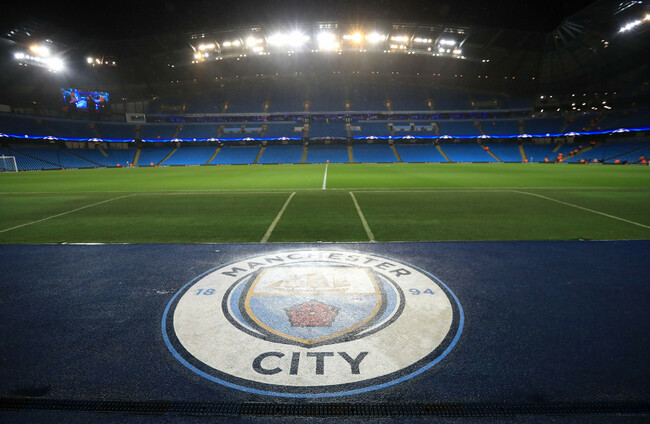AN OVERVIEW OF modern international sport today is incomplete without an understanding of the motivations and potential consequences of sportswashing, and the term is now becoming subject to academic rigour.
A new research paper published this week by Dublin City University studied Manchester City and found that a football club’s supporters can play a significant role in legitimising a sportswashing project, by loudly defending it online through a mixture of whataboutery and false equivalence. The paper is part of a wider study, which is analysing online hate in football.
Dr Gary Sinclair is associate professor of marketing at DCU and a co-author of the study.
“We were looking at the stress and abuse journalists have to put up with when they have to cover a topic like this,” he tells The 42, “and that led is to to the question, ‘How do fans legitimise this style of behaviour? How do they legitimise supporting an ownership connected to human rights abuses and activities widely seen as unethical?’”
Sinclair and his colleagues focused on Manchester City, which since 2008 has been majority owned by the Abu Dhabi United Group, which was founded by Sheikh Mansour bin Zayed Al Nahyan, Vice President of the United Arab Emirates.
Sinclair and his colleagues distinguish sportswashing from soft power, saying that while both phrases overlap in the sense of using sport to project a positive image, sportswashing involves a more conscious means of distraction, and “to obfuscate or divert attention away from less favourable associations.”
They also delineate different types of sportswashing: event-based – such as the hosting of a World Cup or Olympic Games – and investment-based, with Man City falling into the latter category.
For the study, Sinclair and his colleagues analysed messages posted on a long-running Manchester City fans’ forum, which has between 75,000 and 80,000 users. This begs a question – how can an online fan forum be representative of an entire fan base?
“It’s important to clarify that even if there’s 75-80,000 users on that forum, they do not represent the entire Man City fanbase,” says Sinclair in reply. “Why we felt it was important to look at a fan forum like that – and while they may not represent all the fanbase – they are very influential in terms of what kind of discourses are used when the club is under discussion.
“They are highly committed fans, and that has an influence on the everyday supporters to a degree. It doesn’t represent all their fans and it doesn’t represent all football fans either. Someone asked me the other day if this is the same for Newcastle or PSG, and I don’t know the answer to that question as we only looked at Man City as a case study.”
The study analysed every message posted under three separate threads on the forum:
- MCFC’s 2019 FA Cup final victory which completed an unprecedented English domestic trophy treble
- The announcement that the Court of Arbitration for Sport had overturned Uefa’s sanctions on MCFC in July 2020
- A thread discussing MCFC’s announcement of record profits in 2022
The report states it found “little or no opposition to – or even criticism of – the Abu Dhabi United Group’s ownership”, and found forum users engaged in multiple styles of arguments to defend their club and legitimate its ownership.
The club’s advantages over its rivals, for instance, is framed as the result of the unique savviness of those who run the club. “He [Sheikh Mansour] obviously knows exactly what he’s doing and that really grinds the gears of our enemies,” reads one message.
An obvious source of that advantage is City’s wealth, which the report finds is acknowledged by forum users but is framed as the only means of competing against the most successful clubs across English football history, such as Manchester United and Liverpool.
One forum post reads: “Liverpool, as much as any other club (apart from maybe United and Spurs) were responsible for the monetisation of English football. They helped created the landscape they claim to despise. They formed the honeypot that made the likes of Mansour want a slice of the pie. They just don’t like how it turned out. Be careful what you wish for.”
This, the report states, is a means of City fans retaining the club’s historic identity as an unfashionable underdog, and their owner’s wealth is the only means of competing in a system set up against them. As one forum user posts, “Uefa’s unfair and elite protectionist Financial Fair Play regulations […and…] the established and jealous European elite Premier League clubs who collectively over the years rigged the PL and CL so they would profit and suppress any other PL club’s ability to challenge their dominance.”
The report also states that human rights abuses associated with the UAE government are dismissed through “moral analogies”, or whataboutery. “I always find it interesting that ‘human rights’ are banded about as though it’s only a problem in certain countries. […] some people who throw accusations at City should read what their owners countries get up to. Glasshouses and stones springs to mind,” reads one forum post quoted in the report.
All of this, the report states, shows a potential benefit of sportswashing: “the recruitment of a body of aggressive, emotionally invested supporters.”
I ask Dr Sinclair is this is proof that sportswashing works as intended.
“My answer to it is I think it can work,” he replies.
Equally, the research shows that sportswashing need not be inevitable nor inexorable, as it is often portrayed. If supporters have the power to legitimise their club’s ownership, do they not also have the power to reject it?
“Football fans are very powerful”, says Sinclair. “Look at the Bayern Munich fans around the sponsorship with Qatar Airways – they did not accept it. That’s down to the ownership structures around already: fans have power in the sense of having a vote, along with social and metaphorical power. Look at the Super League: fans do have an influence if they can be co-opted, which is very difficult to do. There is enough power among fan groups that if they don’t like an ownership, it is difficult to turn around. But the question is what happens if a nation state owns you, as opposed to, say, a factory owner from Burnley?”
The full research can be read here.


